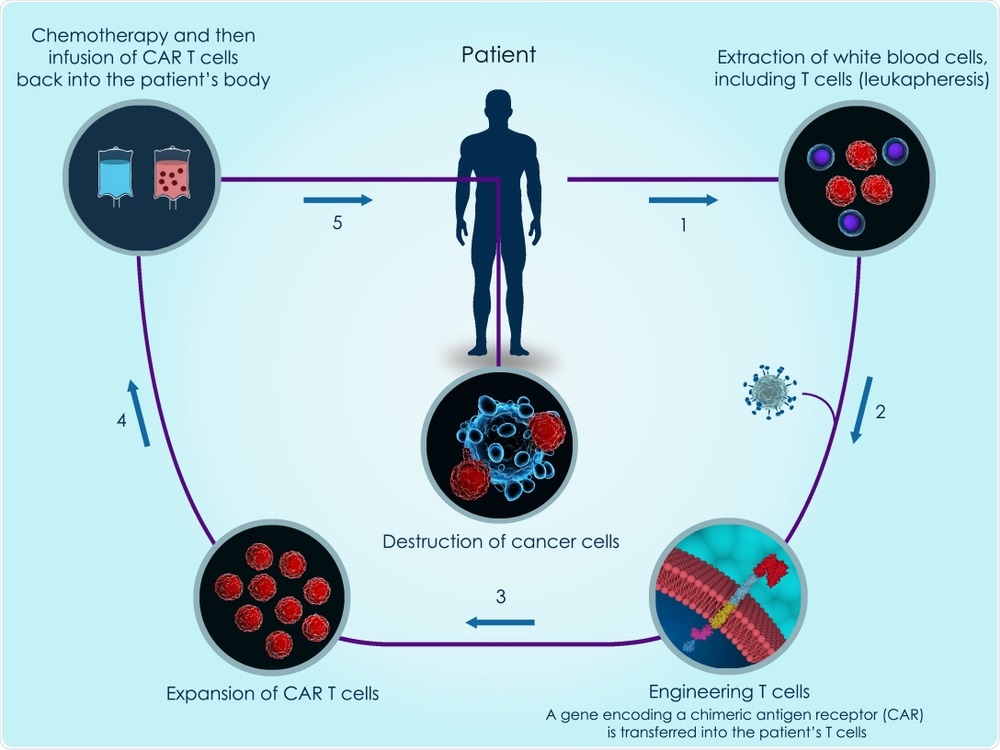Chimeric antigen receptor (CAR) T cell therapy is a new and, in some cases, highly effective form of immunotherapy to treat certain types of cancer of the blood and lymph system.

Image Credit: Meletios Verras/Shutterstock.com
This promising treatment comes at a cost, however: The manufacturers charge up to EUR 320,000 for the production of immune cells for a single patient. By determining the fixed and variable costs involved, researchers from the German Cancer Research Center (DKFZ) established that cellular immunotherapy could be produced at a scientific institution such as DKFZ at around a tenth of the cost.
For several years now, physicians have been achieving considerable success using an innovative form of immunotherapy in patients with certain types of cancer of the blood and lymph system: The treatment involves harvesting immune cells (T cells) from the patient and modifying them outside the body to make them more effective in attacking the malignant leukemia cells.
To do so, the researchers equip the cells in the laboratory with a specific receptor protein. This chimeric antigen receptor (CAR) recognizes a protein molecule as a target structure that is formed by every cancer cell in certain types of leukemia. The CAR T cells are subsequently propagated and transferred back to the patient - where they hunt down malignantly transformed leukemia cells, sometimes with spectacular success.
Two commercial CAR T cell products have been approved to treat patients with acute lymphoblastic T cell leukemia and non-Hodgkin lymphomas such as diffuse large cell B cell lymphoma. They are only used if other treatment options have failed. The treatment is often effective: two years after treatment, 40 to 60 percent of patients have not relapsed.
This promising and highly individualized treatment comes at a cost, however: In Germany, the manufacturers charge up to EUR 320,000 for the production of CAR T cells for a patient. "CAR T cell therapy is still only feasible in a few cancer patients, but this treatment approach will hopefully be able to be extended to other types of cancer.
There is considerable concern that our health care systems will not be able to meet the costs of this potential increase in the number of patients," Michael Schlander, a health economist at DKFZ, explained.
As an alternative to the two CAR T cell products developed by large pharmaceutical companies, many research institutions, including DKFZ, hope to manufacture the therapeutic cells themselves. For the first time, health economist Schlander, immunologist Stefan Eichmüller and their team of researchers at DKFZ have now listed in detail the costs incurred by an academic institution in producing CAR T cell therapies.
The fixed and variable costs included setting up a clean room, laboratory materials, equipment, and all salaries and non-wage labor costs for the specially trained laboratory staff. As expected, the calculated costs were heavily dependent on the capacity utilization rate of the fully automated production system for the cells. The researchers based their calculations on different scenarios, including a maximum annual capacity utilization rate of the machine with 18 CAR T cell products.
Under these conditions, DKFZ could produce a CAR T cell product to treat a patient for less than EUR 60,000. "That would be only about a fifth of the price that the companies charge. And we can cut these costs even further by a considerable amount," Michael Schlander explained, adding that the greatest savings could be made if several of the automated production machines were operated at the same time.
An alternative method of transferring the genes for the chimeric receptor could further reduce the production costs to as little as around EUR 33.000 Euro - a tenth of the current commercial price.
Without the time needed to send the patient's blood and the finished cell therapy, we can provide the treatment within 12 to 14 days - a considerable reduction compared with the three- to four-week waiting time for the commercial products. Patients might then need less chemotherapy and would spend less time in the hospital, which would lead to further savings,"
Stefan Eichmüller
The analysis did not take account of the cost of license fees. Michael Schlander and Stefan Eichmüller hope that the present study will also encourage the manufacturing companies to review their current pricing policy for CAR T cell therapies.
Journal reference:
- Tao Ran, Stefan B. Eichmüller, Patrick Schmidt, Michael Schlander: Cost of decentralized CAR T cell production in an academic non-profit setting. International Journal of Cancer 2020, DOI: 10.1002/ijc.33156